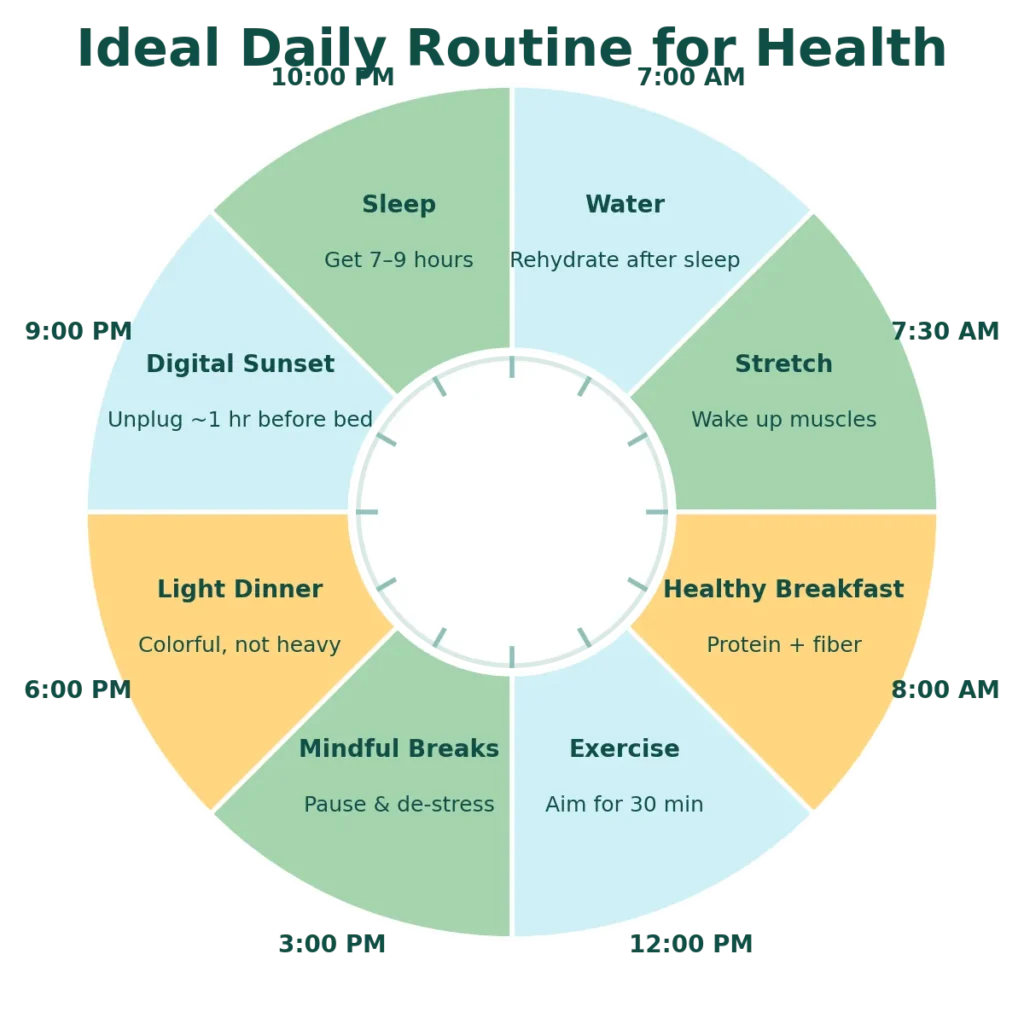A healthy lifestyle isn’t built overnight — it’s the sum of small, consistent actions you take every day.
The way you structure your routine can influence your energy levels, focus, mood, and long-term health.
This guide will walk you through a simple, research-backed daily schedule that supports your body and mind without feeling overwhelming.
Think of it as your personal wellness blueprint.

7:00 AM – Drink Water
Why: After 7–8 hours of sleep, your body is mildly dehydrated. Even mild dehydration can affect mood, brain function, and energy levels.
Tip: Keep a glass of water by your bed so you can rehydrate as soon as you wake up.
7:30 AM – Stretch
Why: Gentle stretching in the morning improves blood flow, eases stiffness, and activates muscles for the day ahead.
Tip: Try 5–10 minutes of yoga or simple full-body stretches. This can also help wake up your mind.
8:00 AM – Healthy Breakfast
Why: A balanced breakfast helps stabilize blood sugar, supports focus, and prevents mid-morning energy crashes.
Tip: Combine protein, healthy fats, and complex carbs — for example, eggs with spinach on whole-grain toast or Greek yogurt with berries.
12:00 PM – Exercise
Why: Regular movement improves cardiovascular health, strengthens muscles, and boosts mood through endorphin release.
Tip: Aim for at least 30 minutes of moderate activity — brisk walking, cycling, or even dancing.
3:00 PM – Mindful Breaks
Why: Short mental breaks reduce stress, improve focus, and prevent burnout.
Tip: Spend 2–5 minutes focusing on your breath, doing a body scan, or stepping outside for fresh air.
6:00 PM – Light Dinner
Why: Eating a lighter meal in the evening supports better digestion and improves sleep quality.
Tip: Fill half your plate with vegetables, one-quarter with lean protein, and one-quarter with whole grains. Avoid heavy, greasy foods close to bedtime.
9:00 PM – Digital Sunset
Why: Exposure to screens before bed can delay melatonin production, making it harder to fall asleep
Tip: Switch to relaxing, screen-free activities like reading, journaling, or gentle stretching.
10:00 PM – Sleep
Why: Quality sleep is essential for memory, mood regulation, immune function, and overall well-being
Tip: Aim for 7–9 hours per night. Keep your bedroom cool, dark, and quiet for optimal rest.
Final Thoughts
This daily routine isn’t about perfection — it’s about creating a structure that supports your physical health, mental clarity, and emotional balance.
Start by adding one or two habits and build from there. Over time, these small changes can make a big difference in how you feel every day.

